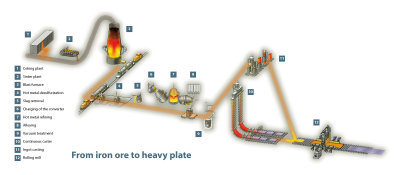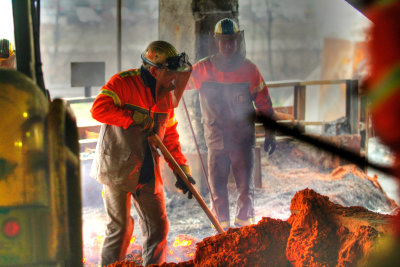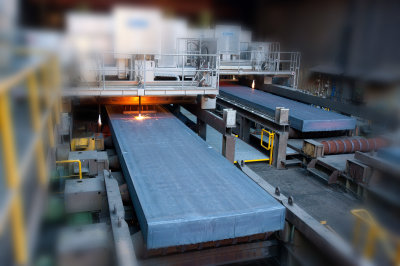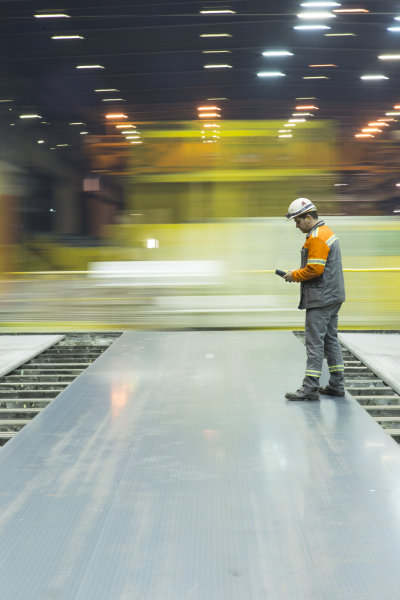Production
Production at Dillinger – high quality from start to finish
Anyone aiming to set new standards in heavy plate has to go the whole way – from the "hot metal" (unrefined iron), via steelmaking, up to and including the treated finished plate. Only in this way can all the decisive factors be controlled, optimised and perfectly harmonised with each other to achieve maximum production quality and supply reliability from start to finish.
At Dillingen, all processes, technologies and capabilities are concentrated at a single location. Iron smelters, steelmakers, metallurgists and steel rollers work together here hand-in-hand, producing solutions that convince in cooperation with our demanding customers.
The processes
Pig iron, known to steelmakers as "hot metal", is produced in the blast furnaces from iron ore, coke, coal and additives. This is the task of ROGESA, a joint subsidiary of Dillinger and Saarstahl. ROGESA operates two blast furnaces of 11.2 and 12.0 m hearth diameter, respectively. Upstream of the blast furnaces are two sinter plants. Coke is supplied predominantly from the Zentralkokerei Saar (ZKS) coking plant, also owned jointly by Dillinger and Saarstahl.
The blast-furnace process is being continuously optimised to achieve higher efficiencies and quality, by means, for example, of extremely high coal-injection rates. Sustainability is also of great importance, however, and by-product gases are converted to electrical energy in a blast-furnace gas power plant located at Dillingen.
The production of hot metal also yields a by-product: slag, which is used as an ecologically safe building material in highway construction, or in the cement industry, in the form of ground granulated blast-furnace slag (GGBFS).
Hot metal is refined with the addition of recycled scrap to make crude steel using the basic oxygen process in two 190 t converters in the LD steelmaking plant. This process converts the high-carbon iron to low-carbon steel. An important operation in the steelmaking plant's process takes the form of so-called secondary metallurgical treatments, such as vacuum treatment of the liquid steel, for example. VD vacuum degassing installations make it possible to adjust extremely low residual contents of detrimental impurity elements – such as sulphur, for instance – in the steel and to match alloying to the downstream rolling process. The capacity of the vacuum installations is dimensioned to permit treatment of the entire production quantity for the achievement of ultra-high cleanness in these steels.
The steelmaking plant's main products are continuous-cast slabs, which are cast in formats of up to 600 x 2,200 mm - a world record! Both the vertical bending and the vertical process are used in Dillinger's steelmaking plant. These processes achieve much superior cleanness throughout the entire cross-section of the slab than other continuous-casting systems. Other products of the steelmaking plant include conventionally cast ingots of up to 60 tonnes gross weight, and steel castings.
Dillinger's heavy-plate rolling-mills, located at Dillingen and Dunkirk (Dillinger France), are among the most powerful in the world. They are used to transform slabs and ingots into heavy plates, frequently with out-of-the-ordinary dimensions. Lengths of up to 40 m, widths of above 5 m and thicknesses of up to 600 mm are no rarity here. The steelmaking plant, rolling-mill and Product Development departments co-operate closely to produce tailor-made heavy plates: chemical composition, rolling process and heat-treatment parameters are optimally matched to the steel's specified requirement profile.
Two four-high reversing stands in each case form the centrepiece of the two rolling lines. These, with unusually large roll-body lengths of up to 5.5 m, permit the production of exceptionally wide plates and high item weights. Extremely high reduction ratios can be achieved even when rolling very thick plates, thanks to the enormous rolling force applied, of a maximum of 108,000 kN (around 11,000 tonnes).
The production of heavy plates in all required delivery states is possible when these plants' cooling lines and heat-treatment furnaces plus a quenching-and-tempering system are included.
Every plate that leaves our mills is submitted prior to shipping to an inspection in accordance with the customer's specifications. Non-destructive testing, such as surface inspection, geometrical and dimensional checks, and ultrasonic inspection, is performed on the plate itself during the flow of production. Specimens are taken and examined using the most diverse range of test procedures in the acceptance-inspection laboratory in order to check mechanical and technological properties, such as yield strength, tensile strength, hardness, Charpy V-notch toughness, etc..
Extensive loading and transportation capacities – whether by road, rail or water, via Dillingen's inland harbour and various seaports – permit high flexibility, assuring fast and efficient delivery to our customers.

Innovative top-quality steel products, total orientation around our customers' needs and unceasing technological development in close cooperation with our partners form the basis of our success - as they have for more than 333 years.
© 2016 Dillinger All rights reserved.
Contact
AG der Dillinger Hüttenwerke
Werkstraße 1
66763 Dillingen/Saar
Tel.: +49 6831 47 0
Fax: +49 6831 47 2212
E-Mail: info@dillinger.biz
Imprint
| Data privacy statement
| T&C





